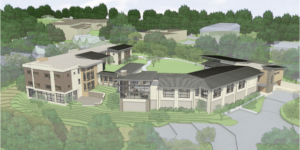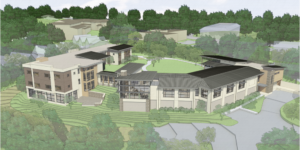Ziggy K. came to Skyland Trail, a residential mental health center, with a diagnosis of bipolar disorder and drug addiction last year.

He abruptly left the Atlanta facility in the middle of his treatment. But after a couple of weeks, he returned.
“I came back pretty defeated,’’ Ziggy, now 21, told visitors to Skyland Trail this week. (His full name is not being used for reasons of confidentiality.)
After his return, he said, he really started addressing his mental illness and addiction. His second stay at Skyland Trail lasted about three months.
“The things I learned here stay with me,’’ he added. “Skyland Trail is still a part of my daily life.”
“I’m nine months sober now,’’ he said. “That’s the longest I’ve been sober since I was 13.”
Skyland Trail, a nonprofit mental health treatment organization, will open a new Atlanta campus in October that will serve young adults like Ziggy.
The expansion, funded by $19 million in philanthropic donations or grants, will add a residence and treatment facility with 32 beds for young adults ages 18 to 26. The new area will be called the Rollins Campus, recognizing a gift from the O. Wayne Rollins Foundation.
Currently, Skyland Trail operates 48 beds between two Atlanta campuses, and 60 percent of patients are in that young adult age range.
Skyland Trail officials say demand for services for young adults is increasing, which may be, at least in part, due to the Affordable Care Act allowing coverage for children up to age 26 on their parents’ health plan.
Ziggy joined other former Skyland Trail patients who live in metro Atlanta on a recent panel at the treatment center.
Sherry Jenkins Tucker of the Georgia Mental Health Consumer Network said this week that Skyland Trail’s expansion is “filling a gap.’’
“People in that transition age are in such need for support,’’ she said. “Often they’re struggling tremendously. It’s a challenging time anyway, and . . . with mental health and addictive disease challenges, it’s that much more difficult.”

Skyland Trail serves older adults as well.
Toni R., 63, a physician who became a patient, said during the panel discussion that she had experienced her “first psychotic episode’’ at age 56.

After spending time in other mental health facilities, Toni recently came to Skyland Trail, where she spent five months.
She told visitors that during her time there, she was impressed by the “compassion and acceptance’’ of the staff.
The benefits of her experience went beyond mental health, Toni added. “We had a special nutritional program, and I was able to lose a lot of weight.”
Another former patient, Tori P., 34, said she had gained ‘’a sense of hope’’ through her time at Skyland Trail.
“It was a challenge to think differently about everything,’’ Tori said. “I learned how to be stable and grew professionally.”

